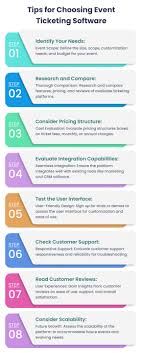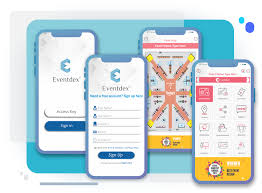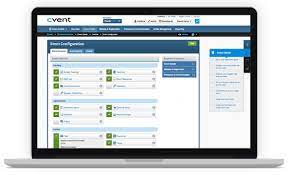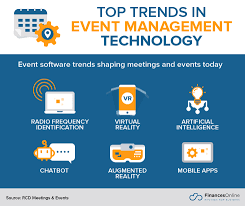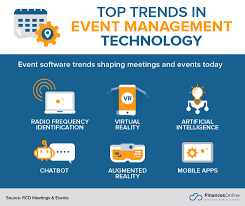Cvent Event Management Software: Streamlining Your Event Planning Process
In today’s fast-paced world, organizing successful events requires efficient and effective management tools. That’s where Cvent Event Management Software comes into play. With its comprehensive suite of features, Cvent empowers event planners to streamline their processes and deliver exceptional experiences for attendees.
One of the key advantages of Cvent is its ability to handle the entire event lifecycle, from planning to execution and post-event analysis. The platform offers a user-friendly interface that allows planners to effortlessly create event websites, manage registrations, handle marketing campaigns, and even facilitate onsite check-ins.
Event registration becomes a breeze with Cvent’s customizable forms and workflows. Planners can easily design branded registration pages tailored to their specific event needs. Attendees can quickly register and provide necessary information, while organizers gain valuable insights into attendee demographics.
Cvent also simplifies the promotion of events through its integrated marketing capabilities. From email campaigns to social media integration, planners can reach their target audience effectively and maximize attendance rates. Real-time analytics provide valuable data on campaign performance, allowing for adjustments and optimization.
On the day of the event, Cvent ensures smooth operations with its mobile check-in feature. Attendees can quickly check-in using QR codes or digital badges, eliminating long queues and enhancing the overall experience. Planners can track attendance in real-time and make necessary adjustments on the go.
Post-event analysis is crucial for measuring success and identifying areas for improvement. Cvent offers robust reporting tools that provide detailed insights into attendee feedback, session attendance rates, and overall event performance. This data enables planners to make data-driven decisions for future events.
Furthermore, Cvent integrates seamlessly with other popular software systems such as customer relationship management (CRM) platforms or marketing automation tools. This integration eliminates manual data entry tasks and ensures data accuracy across different systems.
Security is also a top priority for Cvent. The platform adheres to industry-leading data protection standards, ensuring that sensitive attendee information remains secure throughout the event management process.
In summary, Cvent Event Management Software offers a comprehensive solution for event planners. From planning to execution and analysis, Cvent streamlines the entire event lifecycle. Its user-friendly interface, robust features, and integration capabilities make it a valuable tool for organizing successful events. With Cvent, event planners can focus on creating memorable experiences while leaving the logistical complexities to the software.
8 Essential Tips for Maximizing Your Cvent Event Management Software
- Create a comprehensive event plan
- Utilize the comprehensive suite of tools
- Leverage the reporting capabilities
- Use the automated email feature
- Integrate with other software programs
- Make use of templates
- Keep track of attendance
- Take advantage of support services
Create a comprehensive event plan
Creating a Comprehensive Event Plan with Cvent Event Management Software
When it comes to organizing successful events, having a well-thought-out plan is essential. With Cvent Event Management Software, you have a powerful tool at your disposal to create a comprehensive event plan that covers all the necessary details.
One of the first steps in event planning is defining your objectives and goals. Cvent allows you to clearly outline your event’s purpose, whether it’s a conference, trade show, or corporate gathering. By setting specific goals, you can better align your event activities and measure success.
Next, consider the logistics of your event. Cvent enables you to efficiently manage venue selection, room layouts, and equipment requirements. With its intuitive interface, you can easily visualize floor plans and make adjustments as needed. This ensures that every aspect of your event is organized and optimized for success.
Another crucial aspect of event planning is attendee management. Cvent simplifies the registration process by providing customizable forms that gather all the necessary information from attendees. You can easily track registrations in real-time and communicate important updates through automated email campaigns.
Cvent also offers robust marketing tools to promote your event effectively. From personalized email invitations to social media integration, you can reach your target audience effortlessly. The software provides analytics on campaign performance so that you can refine your marketing strategy for maximum impact.
As part of your comprehensive plan, consider incorporating engagement activities during the event itself. Cvent allows you to create interactive sessions, surveys, and networking opportunities that keep attendees engaged and satisfied. By leveraging these features, you enhance the overall experience and leave a lasting impression on participants.
Post-event evaluation is equally important for future planning endeavors. With Cvent’s reporting capabilities, you can analyze attendee feedback, session attendance rates, and other key metrics. This valuable data helps you identify areas for improvement and make informed decisions for future events.
In conclusion, utilizing Cvent Event Management Software enables you to create a comprehensive event plan that covers all aspects of your event. From defining objectives to managing logistics, attendee registration, marketing, engagement activities, and post-event analysis, Cvent provides the tools you need for successful event planning. By leveraging this powerful software, you can ensure that your events are well-organized, engaging, and memorable for all participants.
Utilize the Comprehensive Suite of Tools in Cvent Event Management Software
When it comes to event planning, having the right tools can make all the difference. That’s why Cvent Event Management Software offers a comprehensive suite of tools designed to streamline your event planning process and ensure its success.
One of the standout features of Cvent is its wide range of tools that cover every aspect of event management. From creating event websites to managing registrations, marketing campaigns, and even onsite check-ins, Cvent has you covered.
With Cvent’s intuitive interface, you can easily create professional-looking event websites that showcase your brand and provide attendees with all the necessary information. Customize registration forms to collect attendee details efficiently and tailor workflows to fit your specific needs. This flexibility ensures a seamless registration experience for your attendees.
Marketing your event becomes effortless with Cvent’s integrated marketing tools. Craft engaging email campaigns and leverage social media integration to reach your target audience effectively. Monitor campaign performance in real-time using analytics, allowing you to make data-driven decisions and optimize your marketing efforts.
On the day of the event, Cvent simplifies check-in processes with its mobile check-in feature. Attendees can quickly check-in using their mobile devices or digital badges, eliminating long queues and enhancing their overall experience. Real-time attendance tracking ensures accurate headcounts and enables organizers to manage resources efficiently.
Post-event analysis is crucial for evaluating success and identifying areas for improvement. With Cvent’s robust reporting tools, you can gain valuable insights into attendee feedback, session attendance rates, and overall event performance. Analyzing this data helps you understand what worked well and what could be enhanced in future events.
Cvent also offers seamless integration with other software systems such as customer relationship management (CRM) platforms or marketing automation tools. This integration eliminates manual data entry tasks and ensures consistency across different systems.
In conclusion, by utilizing the comprehensive suite of tools in Cvent Event Management Software, you can streamline your event planning process and deliver exceptional experiences for your attendees. From creating event websites to managing registrations, marketing campaigns, and check-ins, Cvent empowers you to plan and execute successful events with ease. Take advantage of these tools and watch your events thrive!
Leverage the reporting capabilities
Leverage the Reporting Capabilities of Cvent Event Management Software for Data-Driven Insights
When it comes to organizing successful events, data is key. That’s why it’s crucial to leverage the powerful reporting capabilities of Cvent Event Management Software. With its robust reporting tools, Cvent allows event planners to gain valuable insights and make data-driven decisions for future events.
Cvent offers a wide range of reporting options that provide in-depth analysis of various aspects of your event. From attendee registration and session attendance to post-event surveys and overall event performance, you can access detailed reports that give you a comprehensive view of your event’s success.
By utilizing these reporting capabilities, you can uncover trends, identify areas for improvement, and measure the impact of your event. For example, you can analyze registration data to understand attendee demographics and preferences. This information helps you tailor your marketing efforts and create personalized experiences that resonate with your target audience.
Tracking session attendance rates allows you to evaluate the popularity and effectiveness of different sessions or workshops. This insight enables you to optimize your agenda for future events, ensuring that attendees get the most value out of their experience.
Post-event surveys play a crucial role in gathering feedback from attendees. With Cvent’s reporting tools, you can easily analyze survey responses and identify areas where your event excelled or fell short. This feedback is invaluable for making improvements and enhancing the overall attendee experience in future events.
The real-time nature of Cvent’s reporting capabilities enables you to monitor key metrics during the event itself. You can track registration numbers, check-in rates, and other important data points in real-time. This allows you to make informed decisions on the spot and address any issues that may arise promptly.
Furthermore, these reports can be customized according to your specific needs. You have the flexibility to choose which metrics are most relevant to your event goals and create tailored reports that provide actionable insights.
In conclusion, leveraging the reporting capabilities of Cvent Event Management Software empowers event planners to make data-driven decisions and optimize their events. By analyzing attendee data, session attendance rates, post-event surveys, and real-time metrics, you can gain valuable insights that contribute to the success of your future events. With Cvent, you have the tools to create memorable experiences based on data-backed insights.
Use the automated email feature
Maximize Your Event’s Impact with Cvent’s Automated Email Feature
In the world of event planning, effective communication is key to driving attendance and engagement. With Cvent’s automated email feature, you can effortlessly stay connected with your attendees throughout the entire event lifecycle.
The automated email feature in Cvent Event Management Software allows you to create personalized and targeted email campaigns that are triggered based on specific actions or dates. This powerful tool saves you time and ensures that your attendees receive timely and relevant information.
One of the primary benefits of using automated emails is their ability to enhance attendee engagement. From the moment someone registers for your event, you can set up a series of pre-event emails to build excitement and anticipation. These emails can include important details about the event, such as agenda highlights, speaker profiles, or special offers. By keeping attendees informed and engaged leading up to the event, you increase their likelihood of attending and participating actively.
During the event itself, automated emails can be used to provide real-time updates and reminders. For example, you can send out notifications about schedule changes, session reminders, or exclusive networking opportunities. These timely communications keep attendees informed and ensure they don’t miss out on any important aspects of your event.
Post-event follow-up is equally crucial for maintaining attendee satisfaction and gathering feedback. With automated emails, you can send personalized thank-you messages to attendees, along with surveys or feedback forms to gather valuable insights. This not only shows appreciation but also allows you to improve future events based on attendee suggestions.
Cvent’s automated email feature also allows for segmentation based on attendee profiles or actions taken within the registration process. This means you can tailor your messages specifically to different groups or individuals. For instance, you can send targeted emails to VIP guests with exclusive perks or customized messages to first-time attendees welcoming them warmly.
By leveraging Cvent’s automated email feature, you unlock a world of possibilities for enhancing attendee experience while reducing manual effort. You can create impactful and personalized communications that resonate with your audience, ensuring they stay engaged and informed at every stage of the event.
In conclusion, using the automated email feature in Cvent Event Management Software is a game-changer for event planners. It enables you to deliver timely, relevant, and personalized messages to your attendees throughout the event lifecycle. By leveraging this powerful tool, you can maximize attendee engagement, improve satisfaction levels, and ultimately create unforgettable experiences for your attendees.
Integrate with other software programs
One of the standout features of Cvent Event Management Software is its ability to seamlessly integrate with other software programs. This integration capability provides event planners with a powerful tool to enhance their event management process and streamline their workflows.
By integrating Cvent with other software programs such as customer relationship management (CRM) platforms or marketing automation tools, event planners can achieve greater efficiency and accuracy in managing attendee data. Manual data entry tasks are eliminated, reducing the risk of errors and saving valuable time.
With CRM integration, event planners can automatically sync attendee information between Cvent and their CRM system. This enables them to have a centralized database of attendee data, ensuring consistency across multiple platforms. Planners can easily access attendee information, track interactions, and personalize communications based on individual preferences.
Marketing automation integration takes event promotion to the next level. By connecting Cvent with marketing automation tools, planners can automate email campaigns, segment their audience based on registration data, and track campaign performance in real-time. This integration allows for targeted and personalized marketing efforts that maximize attendance rates.
Integrating Cvent with other software programs also enhances reporting capabilities. Data from different systems can be consolidated into comprehensive reports that provide valuable insights into attendee behavior, ROI analysis, and overall event success. These insights help planners make informed decisions for future events and demonstrate the value of their efforts to stakeholders.
Furthermore, integration with financial systems simplifies payment processes by automatically syncing registration fees or sponsorship payments between Cvent and accounting software. This minimizes manual reconciliation tasks and ensures accurate financial records for easy tracking and reporting.
In conclusion, integrating Cvent Event Management Software with other software programs is a game-changer for event planners. It streamlines workflows, improves data accuracy, enhances marketing efforts, and simplifies financial management. With seamless integration capabilities, Cvent empowers planners to leverage the full potential of their existing software ecosystem while delivering exceptional events that leave a lasting impression on attendees.
Make use of templates
Make Use of Templates: Simplify and Streamline Your Event Planning with Cvent Event Management Software
When it comes to event planning, time is of the essence. That’s why utilizing templates in Cvent Event Management Software can be a game-changer for busy event planners. Templates offer a simple yet powerful way to streamline your planning process, saving you valuable time and effort.
Cvent provides a wide range of pre-designed templates that cover various aspects of event management. Whether you need to create an event website, registration form, email invitation, or even an agenda, there’s a template available to suit your needs.
Using templates not only speeds up the creation process but also ensures consistency in branding and design. With just a few clicks, you can customize these templates to match your event’s theme and style. Add your logo, choose colors that align with your brand identity, and personalize the content to make it unique to your event.
By leveraging templates in Cvent, you eliminate the need to start from scratch with every new event. Instead, you can save time by building upon existing templates that have already been proven successful. This allows you to focus on other critical aspects of event planning without compromising quality or professionalism.
Another advantage of using templates is their ease of use. Even if you are not a design expert or have limited technical skills, Cvent’s intuitive interface makes it easy for anyone to create visually appealing and functional materials. You don’t have to worry about spending hours learning complex design software or hiring external resources for every small task.
Templates also ensure consistency across different elements of your event. From the website layout to registration forms and email communications, maintaining a cohesive look and feel enhances the attendee experience and reinforces your brand image.
Additionally, as templates are already optimized for mobile devices, you can rest assured that your event materials will look great on any screen size. In today’s mobile-driven world, this is crucial for capturing and retaining attendee engagement.
In conclusion, making use of templates in Cvent Event Management Software is a smart move for event planners looking to simplify and streamline their planning process. By utilizing pre-designed templates, you can save time, maintain consistency in branding, and create professional-looking materials without the need for extensive design skills. So why start from scratch when you can leverage the power of templates to create exceptional events?
Keep track of attendance
One of the most valuable features of Cvent Event Management Software is its ability to help event planners keep track of attendance. With this powerful tool, organizers can easily monitor and manage attendee numbers throughout the event lifecycle.
Keeping track of attendance is crucial for several reasons. Firstly, it allows planners to accurately estimate the expected number of attendees and make informed decisions regarding venue selection, catering, and seating arrangements. By having a clear understanding of attendance numbers in advance, organizers can ensure a seamless experience for all participants.
Secondly, tracking attendance enables event planners to gauge the success of their marketing efforts. By comparing registration numbers against promotional campaigns, organizers can assess the effectiveness of different marketing channels and make adjustments for future events. This data-driven approach helps optimize marketing strategies and maximize event turnout.
Cvent simplifies the process of tracking attendance through its user-friendly interface and real-time reporting capabilities. Planners can easily access up-to-date attendance data at any point during the event planning process. Whether it’s checking registration numbers, monitoring check-ins on the day of the event, or analyzing post-event attendance reports, Cvent provides comprehensive tools for accurate tracking.
Moreover, Cvent offers various methods for capturing attendance data. From traditional check-in lists to advanced QR code scanning or digital badge recognition systems, organizers can choose the method that best suits their event’s needs and enhances attendee experience. These streamlined check-in processes not only save time but also eliminate manual errors associated with manual tracking methods.
By leveraging Cvent’s attendance tracking feature, event planners gain valuable insights into attendee behavior and preferences. They can identify popular sessions or areas of interest based on session attendance rates or track participation in networking activities. This information helps tailor future events to better meet attendees’ needs and preferences.
In conclusion, keeping track of attendance is a crucial aspect of successful event planning. With Cvent Event Management Software’s robust tools and real-time reporting capabilities, organizers can effortlessly monitor attendee numbers and make data-driven decisions. By accurately tracking attendance, planners can optimize their marketing efforts, ensure a seamless event experience, and gain valuable insights for future events.
Take advantage of support services
One of the valuable tips for maximizing your experience with Cvent Event Management Software is to take full advantage of its support services. Cvent understands that event planning can be complex, and they are dedicated to providing assistance every step of the way.
From the moment you start using Cvent, their support team is available to answer any questions or concerns you may have. Whether it’s a technical issue or a query about a specific feature, their knowledgeable staff is ready to provide prompt and helpful guidance.
Cvent offers various support channels to cater to different preferences and needs. You can reach out to their support team via phone, email, or live chat. This ensures that you have access to assistance whenever you require it, allowing you to overcome any obstacles quickly and efficiently.
In addition to direct support, Cvent provides a wealth of resources on their website. Their comprehensive knowledge base includes articles, guides, tutorials, and frequently asked questions (FAQs). These resources cover a wide range of topics and are designed to empower users with self-help options.
Another valuable resource offered by Cvent is their training programs. They provide both online webinars and in-person training sessions conducted by experts in event management software. These sessions offer insights into best practices, advanced features, and tips for maximizing the software’s potential.
By taking advantage of these support services, you can enhance your proficiency with Cvent Event Management Software. The expert guidance provided by their support team will help you navigate any challenges smoothly and make the most out of the software’s capabilities.
Remember, utilizing support services not only saves time but also ensures that you make the most informed decisions when using Cvent. So don’t hesitate to reach out for assistance whenever needed – Cvent’s dedicated support team is there to assist you in creating successful events effortlessly!


